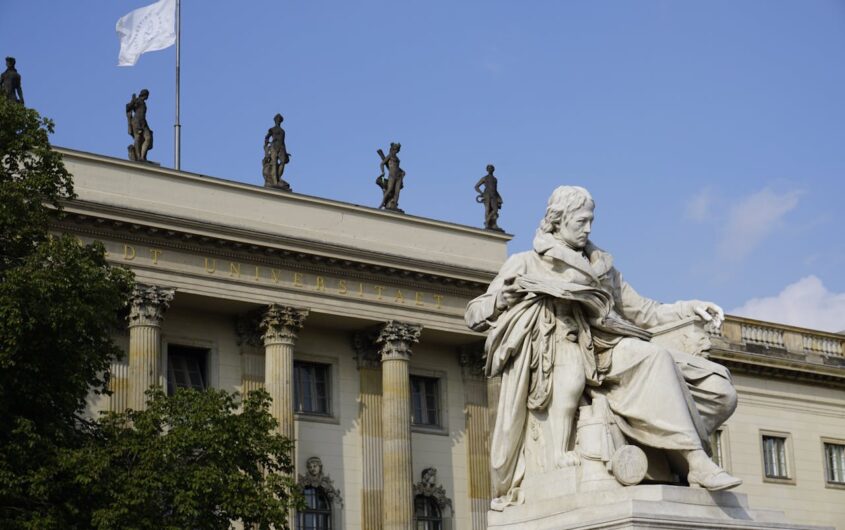
Mustafa Gökhan Ertin via Pexels
A Zeitenwende for Science and Technology Research?

Yixiang Xu
China Fellow; Program Officer, Geoeconomics
Yixiang Xu is the China Fellow and Program Officer, Geoeconomics at AGI, leading the Institute’s work on U.S. and German relations with China. He has written extensively on Sino-EU and Sino-German relations, transatlantic cooperation on China policy, Sino-U.S. great power competition, China's Belt-and-Road Initiative and its implications for Germany and the U.S., Chinese engagement in Central and Eastern Europe, foreign investment screening, EU and U.S. strategies for global infrastructure investment, 5G supply chain and infrastructure security, and the future of Artificial Intelligence. His written contributions have been published by institutes including The Chinese Academy of Social Sciences, The United States Institute of Peace, and The Asia Society's Center for U.S.-China Relations. He has spoken on China's role in transatlantic relations at various seminars and international conferences in China, Germany, and the U.S.
Mr. Xu received his MA in International Political Economy from The Josef Korbel School of International Studies at The University of Denver and his BA in Linguistics and Classics from The University of Pittsburgh. He is an alumnus of the Bucerius Summer School on Global Governance, the Global Bridges European-American Young Leaders Conference, and the Brussels Forum's Young Professionals Summit. Mr. Xu also studied in China, Germany, Israel, Italy, and the UK and speaks Mandarin Chinese, German, and Russian.
__
In March 2024, the German Federal Ministry of Education and Research published its “Position Paper on Research Security in Light of Zeitenwende.” The document asserts that Germany’s approach to science and technology research needs to be reorganized to meet heightened security challenges and strategic competition. As the fourth-largest source of official research funding in the world, after the United States, China, and Japan, the German federal government’s position on the challenge of research security is important. (In 2024, the ministry’s research funding reached 21.5 billion euros.) Although there is no concrete commitment for legislative actions, policy prescriptions contained in the new position paper form a wish list of necessary, though mostly voluntary, community guidelines and new federal government rules and regulations.
While declaring that its strategy is country-agnostic, the paper also clearly reflects growing concerns, particularly over research ties with China. Following the release of the Federal Republic’s first official China strategy in 2023, policy attention on bilateral relations has continued to shift in the direction of competition and systemic rivalry, two elements of the triad (“partner, competitor, systemic rival”) that the coalition government in Berlin now uses to characterize Germany’s relationship with the People’s Republic.
Education & Research Minister Bettina Stark-Watzinger (FDP) has called for Germany to bring its academic practice into closer alignment with its security interests. The minister called for clear limits on China’s direct influence on science and teaching in Germany and, in 2023, became the first German cabinet minister to visit Taiwan in twenty-six years. These changes in German government policy arise against the backdrop of tensions with systemic rivals such as China, which actively seeks to dominate critical technologies and advance military applications through the Chinese Communist Party’s (CCP) Military-Civil Fusion Strategy.
The CCP Strategy aims to co-opt civilian research, along with industrial procurement and production capabilities, to modernize the People’s Liberation Army (PLA) into a “world-class military” by 2049. China’s acquisition of scientists and researchers, many of whom have experience in cutting-edge technology research in the West, as well as research cooperation between Chinese and Western universities and research institutions risk knowledge leakage and granting access to sensitive and privileged information to Chinese entities. Together with the PRC’s 2017 national intelligence law requiring Chinese individuals, organizations, and institutions to assist China’s public security and state security offices in their intelligence work, these Chinese policies constitute a systemic challenge to Germany’s national and economic security as well as that of its liberal democratic allies.
A 2022 investigation by Deutsche Welle and partners found that since 2000, nearly 3,000 studies have been co-authored between European researchers and Chinese academics at military-linked universities, chiefly China’s National University of Defense Technology (NUDT), which plays a crucial role in military research, from hypersonic and nuclear weapons to quantum supercomputers. Among these were research collaborations on quantum technology, artificial intelligence, and computer vision with the University of Bonn, the University of Stuttgart, and the prestigious Fraunhofer Institute.
A separate 2023 report by the U.S.-based Center for Research Security & Integrity found that between 2016 and 2022, Germany-based researchers collaborated on more than 800 papers with institutions under the control of the PLA. A number of these papers’ Chinese co-authors are affiliated with the Chinese Academy of Engineering Physics (CAEP), which is the technology complex responsible for the research, development, and testing of China’s nuclear weapons and is included in the U.S. Government Entity List.
In line with Germany’s China strategy, which calls for de-risking and limiting federal support for research projects that could lead to a “knowledge drain” to China, the new Ministry of Education and Research position paper seeks to prevent potential dual-use research cooperation with China through new guidelines that enable institutions and researchers to better assess the risks of foreign influence, espionage, and dual-use potential when making decisions regarding foreign research collaborations. Public research institutions and universities will also be encouraged to increase transparency of foreign funding sources.
These are sensible steps and are similar to U.S. federal government efforts to strengthen research security. The risk-based approach taken by both countries could potentially spur further bilateral U.S.-German or U.S.-EU cooperation on this topic. But there are also significant differences.
First, the Education & Research Ministry’s strategy places the responsibilities of risk assessment primarily on universities and research institutions themselves and does not envision a mandatory imposition of government requirements in scientific research based on clearly defined risk categories. The United States, owing to its federal government’s extensive sponsorship of scientific research through agencies including the National Science Foundation (NSF) and Defense Advanced Research Projects Agency (DARPA), mandates compliance and disclosure rules through agency funding. The U.S. Congress, by exercising its spending power, has directed federal agencies, for example in Section 1746 of the National Defense Authorization Act (NDAA) for Fiscal Year 2020, to develop descriptions of known and potential threats to federally funded research and development and the integrity of the U.S. scientific enterprise, which in turn are used to guide the update and implementation of federal agency rules. In contrast, the Education & Research Ministry sees its role primarily as a supporter of the development of more robust, but still voluntary, security guidelines within Germany’s science and research community. It also remains unclear whether the Education & Research Ministry plans to implement more rigorous disclosure and reporting requirements through its own research funding. Imposing stricter transparency measures may attract strong opposition from the academic community on the grounds of academic freedom, which is strictly guaranteed under Germany’s constitution.
In line with Germany’s China strategy, the new Ministry of Education and Research position paper seeks to prevent potential dual-use research cooperation with China through new guidelines that enable institutions and researchers to better assess the risks when making decisions regarding foreign research collaborations.
Second, despite calling for a “whole-of-government” approach, key elements of the Education & Research Ministry proposals, including compiling a list of sensitive technologies and opening the Federal Ministry of Defense’s (BMVg) funding for research, require close consultations and cooperation between various federal ministries and the three parties in the coalition government. Currently, there is no German equivalent to either the U.S. National Security Presidential Memorandum-33, a bipartisan research security policy intended to protect U.S. government-supported research and development, or the National Science and Technology Council’s Subcommittee on Research Security, which works to standardize disclosure processes and information sharing across federal agencies. Although there has been no public dissent over the Education & Research Ministry’s position paper from Stark-Watzinger’s cabinet colleagues or major figures in the Green, Social Democrat, and Liberal parties, these proposed interagency initiatives are subject to varying party policy preferences and overlapping agency jurisdictions, which would require careful negotiations even without introducing new legislation.
Third, while the Education & Research Ministry paper reinforces the importance of dual-use risk assessment, it does not invite a discussion of reforming Germany’s export control regime which is the most relevant authority to exercise legal control over foreign research cooperation and third-party funding. While researchers in Germany are already responsible for making voluntary applications regarding foreign academic cooperation for security screening to the Federal Office for Economic Affairs and Export Control (BAFA), many German universities, for example, have no formalized procedures for screening candidates for academic exchange and cooperation with China that comply with the BAFA requirements. In most cases, basic research, which can have dual-use applications, is not subject to approval. The U.S. export control regime, with its complex sets of regulations administered by an array of agencies (The Export Administration Regulations, administered by the Department of Commerce; The International Traffic in Arms Regulations, administered by the Department of the State; The Office of the Foreign Asset Control of the Department of the Treasury), details not only controlled items and activities but also their means of transmission. The implementation of these U.S. export regulations can provide useful lessons for the German government.
Furthermore, the Education & Research Ministry paper insists upon a blanket country-agnostic approach, which differs from the recent U.S. policy of designating “countries of concern” for purposes including restricting data transfers and curtailing outbound investment in national security technologies, enabling a targeted expansion of policy tools to prevent knowledge leakage to strategic adversaries like China. Chancellor Scholz’s recent conciliatory trip to China serves as a key indicator that future measures to alter the structure of Sino-German research exchange and cooperation will likely be weighed by the coalition government against its economic relationship with Beijing, together with several other government objectives such as the energy transition.
Thus, how far the German government is willing or able to go to set up and enforce new standards and procedures remains unclear. For now, one can hope that the Education & Research Ministry’s policy outline is a first step that will usher in more effective changes to secure Germany’s science and technology research that reflect the spirit of Zeitenwende.








